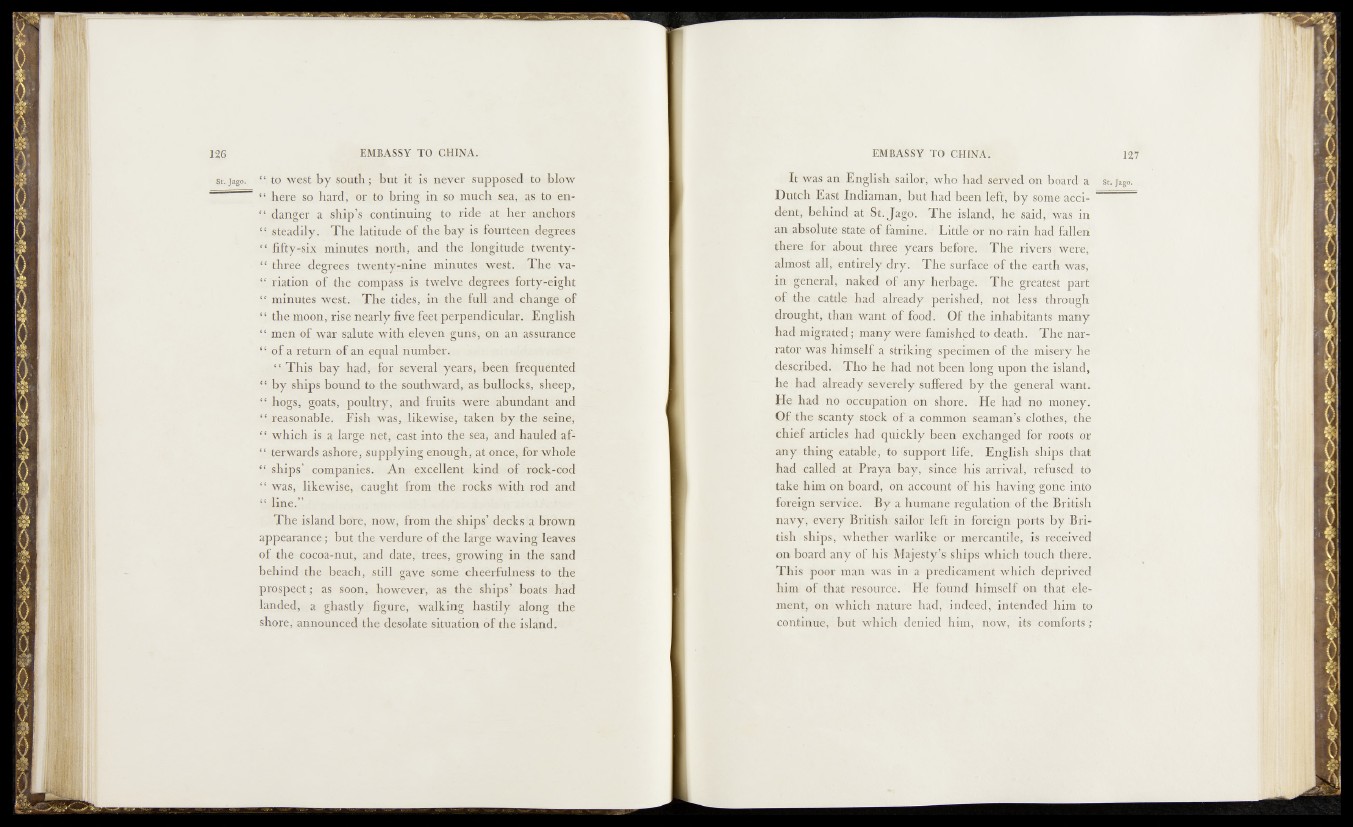
st. jago. “ to west by south; but it is never supppsedto blow
“ here so hard, or to bring in so much sea, as ta en-
“ danger a ship’s continuing > £p ride at her anchors
“• steadily. The latitude of the bary/fs fourteen degrees
“ fifty-six, minutes north, and the longitude twenty-
■ “ three degrees twenty-nine minutes west. The va-
“ riation of 'the compass is twelve degrees forty-eight
“ minutes west.^The tides, in the [full and change of
“ the moon, rise nearly fiye feet-perpepdicular. English
‘I men of. war salute with eleYengunsypn an assurance
* - of, a return of an equal number „ g,
“ This bay had, for several years ;d>een frequented
“ by ships bound to the southward,, astbullocks, sheep,
“ .hugs, goats, poultry, and fruits were abundant1 and
“flreaspnable. Kish was, likewise, taken fey. the/seahe;
“ which is a large net, cast into the.seaj and hauled af-
j‘ terwards ashore, supplying enough, at ©nee,Tur;whole
' eompaides. [ An, excellent kind of rock-cod
“ was, likewise, caught from ithe rocks with rod and
“ fine.” ,
The island bore, now, from the' ships’ decks^a ferown
appearance but the verdure of .the large waving leaves
of the pogoa-nut, and date, trees, growing in the sand
behind ithe beach, still gave jsome cheerfulness to the
prospect; as soqnj,) however, as thè ships’ boats had
lan*le<dk; a ghastly figure, walking hastily along the
shore,' announced the desolate situation óf the island.
It was an English, sailor, who had 'served on board a
Dutch East Indiaman, bufhadlheehffifiV4'by some accident,
behind at St. Jag©*. wThefisland1, s a i d , 'w a s in
an absolute »staterbfsfomasne,' LitllefbrhtoPrain had failed
there; JoiK^taut three years before. The rivers were,
almost all I entirely dry. The' surfafee* of th^'^IrffiPpas,
in-general, naked, ohranybhetba^d.'1 r^Th ef gfhate^t parF
o f the cattle liad> already perished, not’ lcs<^ thioiighr
drought, than want offoodirt Oflfhe inbabifanlsj many
had migrated; many? were; famishedffdld'eath. The.nfe
raloi was'dibuself a striking' s1|^hiun?oh the1 hu-sciv''ho-
described. vFbfof'helhad; not been longhpori' the island,
he bad already severely* suffered by^theit general want.
He had no {occupation on shore. He:had rro’jrrf^i'ey:
Of the scanty stock ofW kommon seaman’srgldiih'esFthte
chief articlesnhad quickly heenf#ijGhan*gdd| for heofis;@jp
any thing eatable, to :supporfe!llfev EftgEsh ships;!that
had called at Prayadbaiy, since his a»n^af^htfi»§$|'bl
take him on board, on taiccoWt of Bis- havirig?'goIfoiini;&
foreign service.? »B y- aJ humari#fe|ulatiohj!@!f the British
navy,' every Britishfaiilorteft in foreign pd£t$ by Bri-r
tish* ships, ’Whether warlike .or’ mercantile, isffljikifrved
on board any of his1 Majekty?’s*^hips- whkmlilisfi'thd rejf
This poor main was in a pr&dieaiBeht which dieprivdd
him ©f that resource. He fcfnndi w^Wel# on thaf.efe-
ment, on which nature ;hw!p®ffidteed; intenddd’ him t©
continue, but whkh; defiied. hiffe, now, its comforts;
St. Jago.